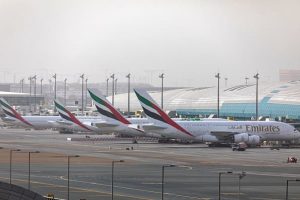Dubai Airports boss blasts UK travel ban as ‘wrong,’ ‘not practical’ as traffic slumps by nearly 70%

- "I think the approach is wrong," Dubai Airports CEO Paul Griffiths told Dubai Eye Radio on Thursday.
- Britain's Transport Secretary Grant Shapps indicated the UAE could stay on the red list due to its status as an international transit hub, despite falling cases and the world's second-fastest vaccination rate.
In this article
DUBAI, United Arab Emirates — The chief executive of Dubai Airports has panned a decision by authorities in the United Kingdom to keep the UAE on its international travel "red" list, as new data from the group shows passenger traffic through the airport fell 67.8% in the first quarter.
"I think the approach is wrong," Dubai Airports CEO Paul Griffiths told Dubai Eye Radio on Thursday, expressing frustration at the rule which bans air travel or forces a costly quarantine on arrival for thousands of Brits in the Emirates who want to go home.
Britain's Transport Secretary Grant Shapps indicated the UAE could stay on the red list due to its status as an international transit hub, despite falling cases and the world's second-fastest vaccination rate.
"I can't be too honest with you about my thoughts about those comments," Griffiths said when asked to respond to the transport secretary. "We've made very strong representations to the British government about the credibility of the numbers here and the way we're handling everything," he said.
Griffiths called for "a far more proactive relationship" to address the confusion surrounding the ruling, as public frustration grows. The UAE remains on the U.K. red list, even though Abu Dhabi has the U.K. on its own "green" list of travel countries.
"There are countries on the (United Kingdom) green list that we believe haven't taken anything like the care and the number of measures that we've put in place here in Dubai to keep everyone safe," Griffiths said. "It's just not practical in terms of how we're going to get back to life as we once knew it," he added.
Spokespersons for the U.K.'s Foreign Office and Transport Ministry were not immediately available for comment when contacted by CNBC. Last week, Shapps said: "We're not restricting the UAE due to the level of coronavirus in the UAE. The issue is one of transit."
The U.K. Foreign Office currently "advises against all but essential travel to the whole of the United Arab Emirates based on the current assessment of COVID-19 risks."
The UAE has administered more than 9.9 million vaccine doses out of its population of roughly 10 million people, only behind Israel in the global vaccination race. Residents in Dubai can choose from the Chinese-made Sinopharm vaccine, U.K.-developed AstraZeneca, the American-German made Pfizer jab or Russia's Sputnik V, while residents of Abu Dhabi could only access Sinopharm until Pfizer was introduced in the capital emirate last week.
Some in the medical community have cast doubt on the efficacy of the Sinopharm shot, due to conflicting figures from interim trials and a lack of published data on its phase 3 trials. It has not yet been approved by the World Health Organization.
Economic and personal costs
The U.K. list, which will be reviewed in the coming weeks, lists 40 high risk countries deemed too dangerous to travel, including India, which is in a state of national crisis as it deals with surging infection rates and a mounting death toll.
The ban also had real world consequences for Dubai Airports, which claims London as a "key single city" for Dubai Airport passenger traffic. Before the pandemic, more than 6 million people would fly between the two cities in a single year, Griffiths said.
"It's almost unthinkable not having a solid air-bridge of flights, 28 services a day, between here and the U.K.," Griffiths said. "The irony, of course, is that you can fly to Scotland but you can't fly to England," he added.
"It's obviously something that everyone here in Dubai is very concerned to resolve very quickly."
The decision also impacts many of the roughly 120,000 U.K. nationals living and working in the UAE and their family members, who have expressed confusion and anger, particularly over the hotel quarantine requirement which runs up a hefty price tag of £1,750 ($2,428) per person.
Source: Read Full Article
